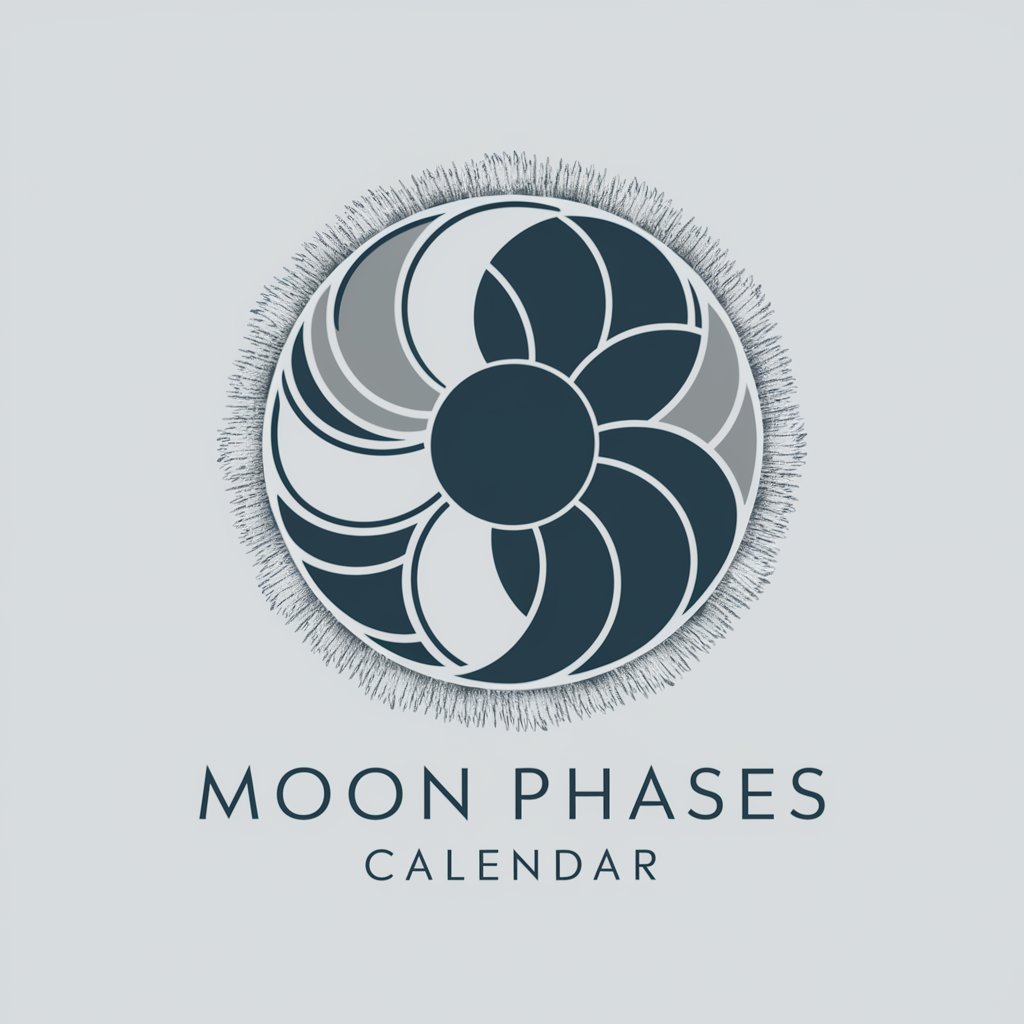Lunar Calendar - Lunar Phase Tracking

Welcome! Let's explore the wonders of the moon together.
Illuminate Your Days with Moon Phases
Can you explain the significance of the new moon in different cultures?
What are the dates and times of the full moons this year?
How do lunar phases affect tides and gardening?
Tell me about the role of the moon in mythology and astrology.
Get Embed Code
Introduction to the Lunar Calendar
The Lunar Calendar is a timekeeping system that is based on the phases of the moon, unlike the Gregorian calendar which is solar-based and follows the Earth's orbit around the Sun. The design purpose of a Lunar Calendar is to track the moon's cycle, from new moon to full moon, which typically completes in about 29.5 days. This cycle is divided into four primary phases: new moon, first quarter, full moon, and last quarter, each holding significance in various cultures for religious, agricultural, and social events. For example, the Chinese Lunar New Year begins on the new moon that appears between January 21 and February 20, illustrating the cultural significance of lunar phases in marking festivals and celebrations. Similarly, in agriculture, some farmers rely on lunar calendars to determine the best times for planting and harvesting, based on the belief that the moon's phase affects plant growth. Powered by ChatGPT-4o。

Main Functions of the Lunar Calendar
Tracking Moon Phases
Example
Providing dates and times for new moons, full moons, and quarter phases.
Scenario
Astronomers and enthusiasts use this function to plan observations of the moon and celestial events. For example, planning a stargazing event on a new moon night when the sky is darkest.
Determining Festivals and Holidays
Example
Calculating dates for religious and cultural festivals that depend on the lunar cycle.
Scenario
Communities such as Muslims for Ramadan and Chinese for Lunar New Year use these calculations to determine the exact dates for these significant occasions.
Agricultural Planning
Example
Guiding planting and harvesting activities based on the moon's phase.
Scenario
Farmers may use lunar calendars to decide on the most auspicious days for planting seeds or harvesting crops, believing that the moon's gravitational pull affects soil moisture.
Astrological Consultations
Example
Offering insights into how lunar phases may influence personal and spiritual life.
Scenario
Individuals interested in astrology might consult the lunar calendar to understand how the moon's phases could potentially affect their emotions, decisions, and future events.
Ideal Users of Lunar Calendar Services
Astronomy Enthusiasts
Individuals fascinated by the night sky and celestial events. They benefit from tracking lunar phases for optimal stargazing conditions and planning observations of lunar eclipses and other astronomical phenomena.
Farmers and Gardeners
Those who adhere to traditional agricultural practices based on the lunar cycle. They use the calendar for determining the best days for planting, pruning, and harvesting, aiming to enhance crop yield and growth.
Cultural and Religious Observers
People who celebrate festivals and holidays determined by the lunar calendar. This includes communities observing Ramadan, Lunar New Year, Diwali, and others, for whom accurate lunar phase information is crucial for planning and participation.
Astrology Followers
Individuals interested in how the moon's phases influence personal and spiritual aspects of life. They consult the lunar calendar for insights into emotional well-being, decision-making, and understanding astrological predictions.

How to Use the Lunar Calendar
Start with a Free Trial
Access a free trial at yeschat.ai, no login or ChatGPT Plus required.
Understand the Phases
Familiarize yourself with the different moon phases and their significance in the calendar.
Identify Your Purpose
Determine what you want to use the lunar calendar for: gardening, fishing, astrology, etc.
Track the Moon
Regularly check the lunar calendar to track the current moon phase and upcoming transitions.
Apply Your Insights
Use the information for planning activities, observing lunar events, or enhancing your spiritual practice.
Try other advanced and practical GPTs
Mystery at Tahoe Forest: The UFO Enigma
Unravel mysteries with AI-powered investigations.

Eventronix
Elevate Events with AI-Powered Humor

Networking Events
Connect, Grow, Succeed: AI-Enhanced Networking

Memories
Revive Your Memories with AI

Corporate Events Planning
Streamline Your Events with AI Precision

Daily Horoscope
Navigate Your Day with Stellar Insight

דני פסיכולוג חרבות הברזל
Empathetic AI for trauma resilience

Festival
Your AI-Powered Festival Companion

Event and Wedding Planner
Streamlining Event Planning with AI

SocialTrendGPT
Harnessing Trends to Empower Nonprofits

Financial Wellness
AI-powered financial advice for everyone

ART Research Assistant
AI-powered Financial Research Assistant

Lunar Calendar FAQs
What is a Lunar Calendar?
A lunar calendar is based on the cycles of the moon's phases, from new moon to full moon, used to track months and significant dates.
How does the Lunar Calendar impact gardening?
Gardening by the lunar calendar considers moon phases to optimize planting, harvesting, and other gardening activities for better growth and yield.
Can the Lunar Calendar predict tides?
While the lunar calendar itself doesn't predict tides, it helps in understanding the moon's phases, which significantly influence tidal patterns.
Is the Lunar Calendar useful for astrology?
Yes, astrologers use the lunar calendar to understand moon phases and zodiac signs' interactions, which they believe influence human behavior and events.
How do different cultures use the Lunar Calendar?
Various cultures use the lunar calendar for religious festivals, cultural rituals, and agricultural activities, reflecting its deep significance in human history.
